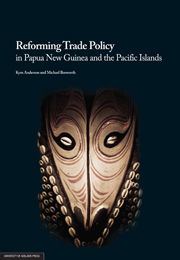Book contents
- Frontmatter
- Contents
- List of charts, tables and boxes
- Foreword, by Michael Manning
- Preface
- About the authors
- Acronyms
- Executive summary
- 1 Introduction
- 2 Performance of Pacific island economies
- 3 Implications on globalization for Pacific development strategies
- 4 Policy reforms to boost development of the Pacific islands
- 5 How can WTO help achieve Pacific island development?
- 6 The supplementary role of APEC
- 7 Choosing the way forward
- APPENDICES
- Appendix 1 Individuals and organizations visited in June 200
- Appendix 2 Public seminar program, Port Moresby, 9 June 2000
- Appendix 3 What WTO accession and membership involve
- Appendix 4 Determinants of structural change in a developing economy
- Appendix 5 List of trade policy terms
- References
Appendix 3 - What WTO accession and membership involve
from APPENDICES
Published online by Cambridge University Press: 05 June 2012
- Frontmatter
- Contents
- List of charts, tables and boxes
- Foreword, by Michael Manning
- Preface
- About the authors
- Acronyms
- Executive summary
- 1 Introduction
- 2 Performance of Pacific island economies
- 3 Implications on globalization for Pacific development strategies
- 4 Policy reforms to boost development of the Pacific islands
- 5 How can WTO help achieve Pacific island development?
- 6 The supplementary role of APEC
- 7 Choosing the way forward
- APPENDICES
- Appendix 1 Individuals and organizations visited in June 200
- Appendix 2 Public seminar program, Port Moresby, 9 June 2000
- Appendix 3 What WTO accession and membership involve
- Appendix 4 Determinants of structural change in a developing economy
- Appendix 5 List of trade policy terms
- References
Summary
Participation in WTO will constitute the cornerstone for PNG trade policy development in the 21st century, as it will for those larger Pacific Island economies that have recently joined WTO (Fiji and Solomon Islands) or are in the process of joining (Samoa, Tonga and Vanuatu). In return for the rights and opportunities that membership of these clubs brings, there are also some obligations and challenges that must be faced. Governments sign on to those obligations presumably because they believe the benefits will outweigh the costs, even though some of the obligations offer political challenges in the short term. In particular, the process of negotiating accession to WTO consolidates and makes it more difficult to reverse a country's economic reforms.
Benefits and obligations of WTO membership
To become a WTO member is to join a club. Like all clubs, the WTO bestows benefits on members but there are some costs; it offers rights but with them come obligations; it provides new opportunities but also some challenges. Evidently the net benefits are overwhelmingly positive, given that more than 120 developing countries will be members within five years. But like all worthy clubs, there are rules to be followed, entry conditions to be met and formal accession procedures to follow. Occasionally the rules and obligations upset political sensitivities because some groups within a country may lose a privilege (e.g., protection from import competition), but almost invariably those rules boost the overall economy of each WTO member.
- Type
- Chapter
- Information
- Publisher: The University of Adelaide PressPrint publication year: 2009



